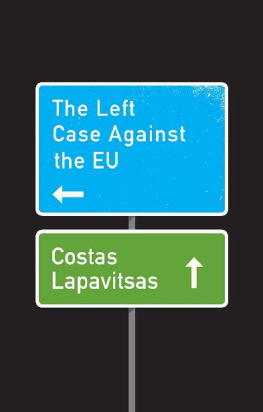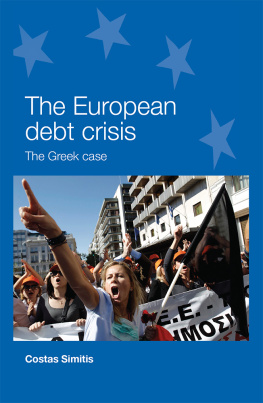Costas Lapavitsas - The Left Case Against the EU
Here you can read online Costas Lapavitsas - The Left Case Against the EU full text of the book (entire story) in english for free. Download pdf and epub, get meaning, cover and reviews about this ebook. year: 2018, publisher: Wiley, genre: Politics. Description of the work, (preface) as well as reviews are available. Best literature library LitArk.com created for fans of good reading and offers a wide selection of genres:
Romance novel
Science fiction
Adventure
Detective
Science
History
Home and family
Prose
Art
Politics
Computer
Non-fiction
Religion
Business
Children
Humor
Choose a favorite category and find really read worthwhile books. Enjoy immersion in the world of imagination, feel the emotions of the characters or learn something new for yourself, make an fascinating discovery.
- Book:The Left Case Against the EU
- Author:
- Publisher:Wiley
- Genre:
- Year:2018
- Rating:5 / 5
- Favourites:Add to favourites
- Your mark:
- 100
- 1
- 2
- 3
- 4
- 5
The Left Case Against the EU: summary, description and annotation
We offer to read an annotation, description, summary or preface (depends on what the author of the book "The Left Case Against the EU" wrote himself). If you haven't found the necessary information about the book — write in the comments, we will try to find it.
The Left Case Against the EU — read online for free the complete book (whole text) full work
Below is the text of the book, divided by pages. System saving the place of the last page read, allows you to conveniently read the book "The Left Case Against the EU" online for free, without having to search again every time where you left off. Put a bookmark, and you can go to the page where you finished reading at any time.
Font size:
Interval:
Bookmark:
Contents
Figures
- 1 Nominal unit labour costs
- 2 Real labour productivity per person
- 3 Current account as percentage of GDP
- 4 Private debt (non-financial corporations and households) as percentage of GDP
- 5 Public debt as percentage of GDP
- 6 Nominal long-term interest rates
- 7 German balance of payments statistics as percentage of GDP
- 8 Current account of core and peripheries as percentage of GDP
- 9 Industrial production (excluding construction, 2000 = 100)
- 10 German outward FDI as percentage of total
- 11 Investment in core and peripheries as percentage of GDP
The Left Case Against the EU
Costas Lapavitsas
polity
Copyright Costas Lapavitsas 2019
The right of Costas Lapavitsas to be identified as Author of this Work has been asserted in accordance with the UK Copyright, Designs and Patents Act 1988.
First published in 2019 by Polity Press
Polity Press
65 Bridge Street
Cambridge CB2 1UR, UK
Polity Press
101 Station Landing
Suite 300
Medford, MA 02155, USA
All rights reserved. Except for the quotation of short passages for the purpose of criticism and review, no part of this publication may be reproduced, stored in a retrieval system or transmitted, in any form or by any means, electronic, mechanical, photocopying, recording or otherwise, without the prior permission of the publisher.
ISBN-13: 978-1-5095-3108-0
A catalogue record for this book is available from the British Library. Library of Congress Cataloging-in-Publication Data
Names: Lapavitsas, Costas, 1961- author.
Title: The left case against the EU / Costas Lapavitsas.
Description: Medford : Polity Press, [2018] | Includes bibliographical references and index.
Identifiers: LCCN 2018020994 (print) | LCCN 2018040086 (ebook) | ISBN 9781509531080 (Epub) | ISBN 9781509531059 (hardback) | ISBN 9781509531066 (pbk.)
Subjects: LCSH: Political parties--European Union countries. | Neoliberalism--European Union countries. | Right and left (Political science)--European Union countries. | Ideology--European Union countries. | Sovereignty.
Classification: LCC JN50 (ebook) | LCC JN50 .L37 2018 (print) | DDC 341.242/2--dc23
LC record available at https://lccn.loc.gov/2018020994
The publisher has used its best endeavours to ensure that the URLs for external websites referred to in this book are correct and active at the time of going to press. However, the publisher has no responsibility for the websites and can make no guarantee that a site will remain live or that the content is or will remain appropriate.
Every effort has been made to trace all copyright holders, but if any have been overlooked the publisher will be pleased to include any necessary credits in any subsequent reprint or edition.
For further information on Polity, visit our website: politybooks.com
Acknowledgements
Several people should be thanked for making this book possible without bearing any responsibility for its shortcomings. Fritz Scharpf and Wolfgang Streeck provided intellectual testing and support during a brief stay in Cologne. Particular thanks should go to Martin Hpner, who, apart from being a sharp interlocutor, went through the text meticulously and with a critical eye. Bob Brenner spent time and effort examining some of the key arguments. Stergios Skaperdas has long been an invaluable port of call to discuss economic and political ideas. Makoto Itoh read the text and made comments with his usual sagacity. C.J. Polychroniou, Paul OConnell, and Agustn Menndez also made useful suggestions. George Owers read the text thoroughly and helped give it its final form. Reference should be made to Thanos Moraitis, Giorgos Diagourtas, and Alkim Kiziltug for help with obtaining materials as well as commenting on the content. Finally, Dimitris Argyroulis read the text carefully and made helpful comments on the content and on the bibliography.
The European Union and the Left
Fragmentation and retreat of democracy
The European Union currently finds itself in a state of profound and uncommon instability. To be sure, the EU has also faced difficulties in the past. After the global economic shocks of the 1970s, for instance, in its previous incarnation as the European Economic Community, it lost direction and went through a period of drift. But the instability of the 2010s is of a different order because it is rooted in economic malfunctioning and has become political. The ideological authority of the EU has shrivelled, its democratic credentials have been devalued, its moral standing has taken a series of blows, and its unity has cracked. In 2016, following a bitterly contested referendum, Britain decided to leave. Moreover, rising right-wing and authoritarian parties in several other countries have begun to pose a direct challenge to the very existence of the EU.
The previous three decades had been very different. In the early 1980s the EEC shook off the torpor of the 1970s and expanded by admitting Greece, Spain, and Portugal. More than the formal accretion of new members, however, it engaged in organizational, institutional, and ideological expansion signalled by the strong presence of the European Commission, led by Jacques Delors. A series of crucial steps were taken, including the Single European Act, signed in 1986, and the Maastricht Treaty of 1992.
The Maastricht Treaty came hard on the heels of the collapse of the Eastern Bloc and the reunification of Germany. It was very much a product of its time marked by the discrediting of state-controlled socialism, the retreat of organized labour in the previous decade in the face of Margaret Thatcher and Ronald Reagan, and the ascendancy of neoliberal economics in both theory and policy. That was the moment of Francis Fukuyamas The End of History and the Last Man , a book that gained tremendous visibility by claiming that liberal democracy and free-market capitalism went hand-in-hand, and together had actually won the grand historical contest among political and social systems.
The EU engaged in further sustained expansion in the 1990s and the 2000s, above all by incorporating a host of new countries in Eastern Europe and developing its international presence. The union lacked an army and had no real foreign policy, but it was an economic giant that had largely eliminated internal barriers to trade and the movement of capital. It was, moreover, in command of a form of money that competed against the dollar as an international reserve. Institutionally it possessed a vast array of laws backing the transnational presence of the European Court of Justice. It also had a complex administrative machinery, with a powerful Commission and a European Parliament, employing a large bureaucracy, mostly in Brussels. The image that the EU increasingly sought to project during those decades was of soft power a beacon of democracy, individual rights, and social protection. A novel political entity appeared to have been created in Europe, a monument to solidarity and peace after the bloodbaths of the twentieth century, which seemed to combine political liberalism and economic neoliberalism.
The global crisis of 20079 and, even more, the Eurozone crisis of 201012 have left that image in tatters. The response of the EU to the crisis pointed to cold calculation rather than solidarity as its operating principle. Sharply hierarchical power structures and hegemonic behaviour made themselves acutely felt within the union. The paramount objective was to rescue the common currency, the euro, for its collapse would have delivered a mortal blow to the structures built after the Maastricht Treaty. The costs of this rescue were imposed overwhelmingly on the weakest member states.
The measures taken and the policies implemented throughout this period were determined by professional politicians and technocratic experts inhabiting the core institutions of the union. A pronounced depoliticization of economic and social policies took place, a process that had actually begun much earlier, as is evident, for example, in the old debate on the crisis of representation, but emerged with ruthless clarity during the global economic crisis.
Next pageFont size:
Interval:
Bookmark:
Similar books «The Left Case Against the EU»
Look at similar books to The Left Case Against the EU. We have selected literature similar in name and meaning in the hope of providing readers with more options to find new, interesting, not yet read works.
Discussion, reviews of the book The Left Case Against the EU and just readers' own opinions. Leave your comments, write what you think about the work, its meaning or the main characters. Specify what exactly you liked and what you didn't like, and why you think so.










